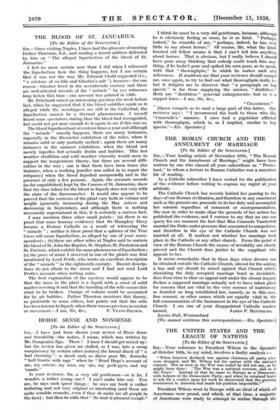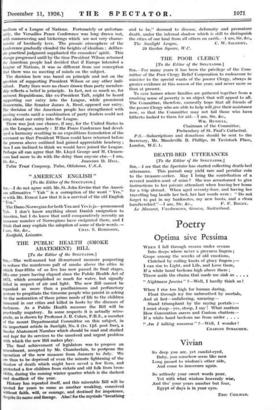THE UNITED STATES AND THE LEAGUE OF NATIONS
[To the Editor of the SPECTATOR.] Sur,—Your reference to President Wilson in the. Spectator of October 16th, to my mind, involves a faulty. analysis :— "When America declared war against Germany all party cries were dropped, and Mr. Wilson led the nation with the nation's consent. But as soon as the War was ended he did not say, as he might have done : The War was a national concern, and so is the Peace.' Instead of that he came to Europe as a Democrat, with helpers of the Democratic Party, and when he returned homo to ask for a verdict upon his work he discovered that the growing resentment in America had made his position impossible."
President Wilson went to Europe with an ideal of which all Americans were proud, and which, at that time, a majority of Americans were ready to attempt to realize through the medium of a League of Nations. Fortunately or unfortun- ately, the Versailles Peace Conference was long drawn out, with manoeuvring and bickerings which are not very charac- teristic of brotherly love. The prosaic atmosphere of the Conference gradually clouded the heights of idealism ; deliber- ate practical judgment supplanted the crusaders' spirit. This change progressed until by the time President Wilson returned the American people had decided that if Europe intended a League of Nations, it was so different from our conception that there was no meeting of minds on the subject.
The decision here was based on principle and not on the question of supporting President Wilson or any other indi- vidual. Party lines were no closer drawn than party member- ship reflects a belief in principle. In fact, not so much so, for eminent Republicans, like ex-President Taft, might be heard supporting our entry into the League, while prominent Democrats, like Senator James A. Reed, opposed our entry. The decision of the American people has strengthened with passing events until a combination of party leaders could not bring about our entry into the League.
There was just one chance, if any, for the United States to join the League, namely : If the Peace Conference had devel- oped a harmony resulting in an expeditious formulation of the covenant so that President Wilson could have returned before the process above outlined had gained appreciable headway ; then I am inclined to think we would have joined the League. Perhaps all can agree that Mr. Lloyd George and M. Clemen- ceau had more to do with the delay than anyone else.—I am,















































 Previous page
Previous page